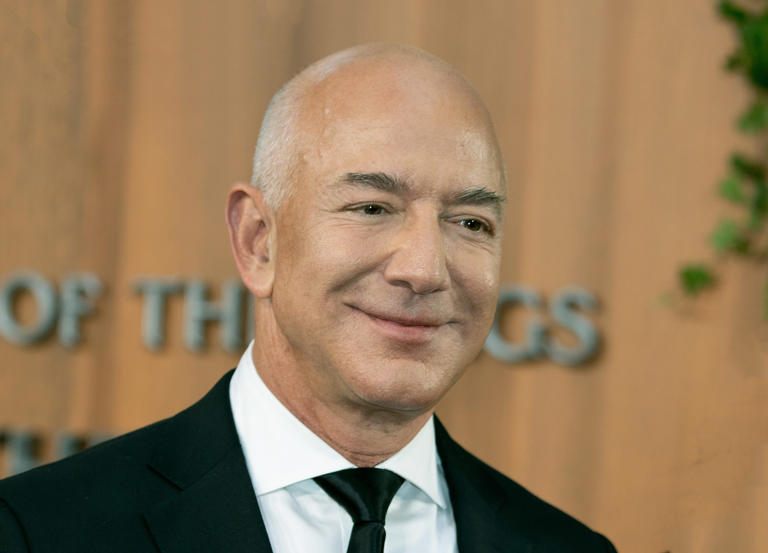“WaPo Shake-Up: Opinion Editor Ousted as Bezos Pushes Pro-Free Market Agenda!”
Jeff Bezos has announced a major overhaul of The Washington Post‘s opinion section, shifting its focus to two core principles: personal liberties and free markets.
In a note to staff, also shared on X, Bezos stated, “We are going to be writing every day in support and defense of two pillars: personal liberties and free markets. We’ll cover other topics too, of course, but viewpoints opposing those pillars will be left to be published by others.”
Bezos, who owns the Post, argued that the internet has made a broad-based opinion section unnecessary. As part of these changes, opinion editor David Shipley is stepping down, and a search is underway for his replacement.
Post publisher and CEO Will Lewis reinforced Bezos’ stance, stating, “This is not about siding with any political party. This is about being crystal clear about what we stand for as a newspaper.”
The shift has drawn criticism from both former and current staff. Martin Baron, the Post’s executive editor from 2013 to 2021, condemned the move, calling it “sad and disgusting.” He argued that Bezos’ decision contradicts the editorial independence he previously championed.
“Bezos argues for personal liberties. But his news organization now will forbid views other than his own in its opinion section,” Baron told Business Insider.
The Post’s chief economics reporter Jeff Stein also raised concerns on X, calling the change a “massive encroachment by Jeff Bezos into The Washington Post’s opinion section,” adding that it signals dissenting views “will not be published or tolerated.”
A current Post news staffer echoed these concerns, telling BI there’s “a lot of tension in the newsroom that we’re next.”
Bezos Overhauls Washington Post Opinion Pages, Sparks Debate
Jeff Bezos has announced a major shift in The Washington Post’s opinion section, emphasizing personal liberties and free markets as its core focus. The move has drawn mixed reactions, with critics calling it an unprecedented level of influence from the paper’s owner.
A New Editorial Direction
In a message to staff, also shared on X, Bezos stated:
“We are going to be writing every day in support and defense of two pillars: personal liberties and free markets. We’ll cover other topics too, of course, but viewpoints opposing those pillars will be left to be published by others.”
Bezos argued that traditional newspapers once served as broad forums for debate, but the internet now fulfills that role. He emphasized that The Post would no longer aim to represent all viewpoints in its opinion section.
As part of this transformation, opinion editor David Shipley has decided to step down. Bezos noted that he had encouraged Shipley to only continue if he was fully committed, and Shipley ultimately chose to leave. A search for a new opinion editor is underway.
Backlash and Concerns Over Editorial Independence
While Post executives insist that newsroom operations remain unaffected, some staffers view Bezos’s messaging as heavy-handed. One current employee, speaking anonymously, described it as “a proclamation coming down from high.”
Post executive editor Matt Murray reassured staff in a memo that the changes applied solely to the opinion section. “The independent and unbiased work of The Post’s newsroom remains unchanged,” he wrote. “We will continue to pursue engaging, impactful journalism without fear or favor.”
However, former Post executive editor Martin Baron criticized the shift, calling it “sad and disgusting.” He accused Bezos of contradicting his previous stance on editorial independence, stating:
“Bezos argues for personal liberties. But his news organization now will forbid views other than his own in its opinion section.”
Chief economics reporter Jeff Stein also expressed concerns on X, calling the move a “massive encroachment by Jeff Bezos into The Washington Post’s opinion section,” adding that dissenting views “will not be published or tolerated.”
A Broader Trend in Media Ownership
This shake-up follows a series of controversies at The Post. In October, the paper opted not to endorse a presidential candidate—reportedly a decision made by Bezos himself.
Tensions escalated further in January when hundreds of Post staffers sent a letter urging Bezos to intervene amid concerns over integrity and transparency within the newsroom.
The situation at The Post mirrors a similar controversy at The Los Angeles Times, where billionaire owner Patrick Soon-Shiong has become more involved in editorial decisions, including blocking an endorsement of then-Vice President Kamala Harris and calling for a more balanced approach to covering Donald Trump.
As Trump ramps up pressure on mainstream media during his campaign, his administration has previously launched investigations into news organizations and restricted certain outlets’ access.
Bezos’s Full Statement to Staff
In his message, Bezos reinforced his belief in free markets and personal liberties as guiding principles for The Post’s opinion pages:
“I am of America and for America, and proud to be so. Our country did not get here by being typical. And a big part of America’s success has been freedom in the economic realm and everywhere else. Freedom is ethical—it minimizes coercion—and practical—it drives creativity, invention, and prosperity.”
He also suggested that the current media landscape does not adequately represent these views:
“I’m confident that free markets and personal liberties are right for America. I also believe these viewpoints are underserved in the current market of ideas and news opinion. I’m excited for us together to fill that void.”
With the search for a new opinion editor underway, Bezos’s reshaping of The Post’s editorial stance marks a significant moment for the paper—and for the broader conversation about media ownership and influence.
